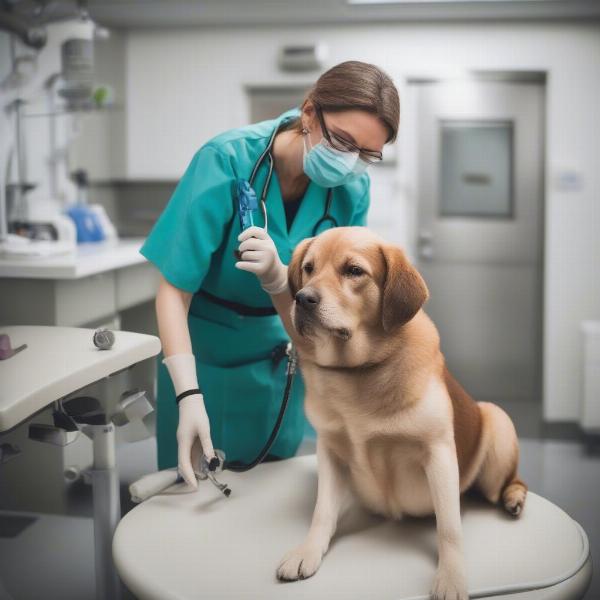Multivitamins for dogs can be a beneficial supplement to their diet, but understanding when and how to use them is crucial. This guide will cover the essential aspects of canine multivitamins, addressing common questions and concerns to help you make informed decisions about your dog’s nutritional needs. We’ll explore the benefits, risks, and everything in between, so you can confidently navigate the world of dog multivitamins.
Do Dogs Need Multivitamins?
Not all dogs require multivitamins. A complete and balanced diet formulated for your dog’s life stage (puppy, adult, senior) should provide all the necessary nutrients. However, certain situations might warrant supplementation, such as picky eating, specific health conditions, or dietary restrictions.
Benefits of Multivitamins for Dogs
Multivitamins can bridge nutritional gaps in a dog’s diet, especially if they’re not consuming a complete and balanced commercial food. They can support overall health, boost the immune system, improve skin and coat condition, and aid in cognitive function, especially in senior dogs. Always consult with your veterinarian before starting your dog on any new supplements, including multivitamins.
Choosing the Right Multivitamin
Selecting the right multivitamin for your dog requires careful consideration. Factors such as age, breed, size, and any underlying health conditions should guide your decision. Look for multivitamins specifically formulated for dogs, avoiding human multivitamins, as they can contain ingredients toxic to dogs. Opt for high-quality products from reputable brands that undergo third-party testing.
Potential Risks and Side Effects
While generally safe when administered correctly, excessive intake of certain vitamins and minerals can be harmful to dogs. Side effects can include digestive upset, such as vomiting and diarrhea, and more serious complications like kidney or liver damage in cases of overdose. Always follow the dosage instructions provided on the product label and consult your veterinarian if you notice any adverse reactions.
Different Types of Multivitamins
Multivitamins for dogs come in various forms, including chewable tablets, capsules, powders, and liquids. Chewable tablets are often the most palatable option, while capsules can be easier to administer to dogs who are reluctant to take supplements. Powders and liquids can be mixed with food for convenient administration.
When to Consult a Veterinarian
Before starting your dog on a multivitamin regimen, consult your veterinarian. They can assess your dog’s individual needs, recommend appropriate products, and advise on the correct dosage. It’s also essential to seek veterinary advice if you notice any unusual symptoms or suspect your dog may have ingested an excessive amount of multivitamins.
Multivitamins for Puppies, Adults, and Seniors
Nutritional needs vary depending on a dog’s life stage. Puppies require specific nutrients to support growth and development, while senior dogs may benefit from supplements that address age-related health concerns, such as joint health and cognitive function. Choose a multivitamin formulated for your dog’s specific life stage.
Homemade Dog Food and Multivitamins
If you’re feeding your dog a homemade diet, it’s crucial to ensure it’s nutritionally complete and balanced. Consult a veterinary nutritionist to create a recipe that meets your dog’s needs. Multivitamins can be a valuable addition to homemade diets to ensure your dog receives all the necessary nutrients.
 Veterinarian Examining a Dog
Veterinarian Examining a Dog
Conclusion
Multivitamins can be a beneficial supplement for dogs in certain situations, but it’s essential to choose wisely and consult your veterinarian before starting any new supplement regimen. By understanding your dog’s individual needs and following the guidance provided in this comprehensive guide, you can ensure your furry friend receives the optimal nutrition they need to thrive.
FAQ
- Are human multivitamins safe for dogs? No, human multivitamins are not safe for dogs and can contain ingredients toxic to them.
- Can I give my dog too many multivitamins? Yes, excessive intake of certain vitamins and minerals can be harmful. Always follow the recommended dosage.
- What are the signs of vitamin toxicity in dogs? Signs can include vomiting, diarrhea, loss of appetite, and lethargy.
- How do I choose the right multivitamin for my dog? Consider your dog’s age, breed, size, and health conditions. Consult your veterinarian for recommendations.
- Can I give my dog multivitamins with other supplements? Consult your veterinarian before combining supplements, as some interactions can be harmful.
- What are some good brands of dog multivitamins? Look for reputable brands that undergo third-party testing. Your veterinarian can provide specific recommendations.
- Are multivitamins necessary for dogs on a raw food diet? Even with a raw food diet, supplementation may be necessary. Consult a veterinary nutritionist.
ILM Dog is a leading online resource for dog owners worldwide, offering expert advice on dog care, nutrition, training, and health. We provide comprehensive guides on various aspects of dog ownership, helping you make informed decisions about your furry friend’s well-being. We cover everything from breed selection to senior dog care, and our team of experts is dedicated to providing reliable, practical information. For personalized advice on your dog’s health and nutrition, including multivitamins, contact our team at [email protected] or call us at +44 20-3965-8624. ILM Dog is your trusted partner in responsible dog ownership.